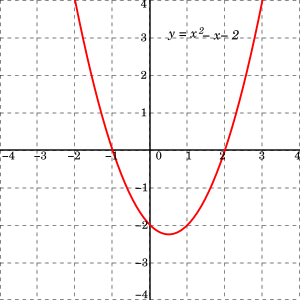What is the axis of symmetry of the quadratic equation
y=x^2+2x+4
x=-1
What are the roots of this equation?

x=-1 and 2
________________ is the name of the quadratic formula represented by
b^2-4ac
discriminant
Factor:
3x-12
3(x-4)
Solve:
x^2=25
x=+-5
Find the y-intercept of the equation
y=4x^2+13x+24
The y-intercept is (0,24)
What is the root of this equation?

x=1
Find the discriminant of
4x^2-5x-4=0
89
Factor:
x^4y+y^2x^2
x^2y(x^2+y)
Solve:
3x^2=12
x=+-4
Find the vertex for the equation
y=2x^2+4x+6
(-1,4)
What are the roots of this equation?
No real solutions
When the discriminant is negative, we know that the graph crosses the x-axis ______ times and the equation has ____________________ (describe the solutions).
0, 2 complex roots
Factor:
x^2+8x+15
(x+5)(x+3)
Solve:
1/2x^2-10=10
x=+-2sqrt10
The minimum or maximum point of a parabola is the _______________.
The __________________ is the line that cuts a parabola "in half".
The ______________ is where the parabola crosses the y-axis.
vertex, axis of symmetry, y-intercept
Write an equation given the roots 3 and 4
x^2-7x+12
Before we use the quadratic formula, we must ______________________________________.
Do that with the equation
-4x^2-5x=4x+2
Make the equation equal zero.
4x^2+9x+2=0 or -4x^2-9x-2=0
Factor:
x^2-5x-50
(x-10)(x+5)
Solve:
4x^2=-64
x=+-4i
What is the vertex of the equation
y=-3x^2+12x-20
(-2, -56)
Write the equation with the roots of -4 and 5.
x^2-x-20
Use the quadratic formula and go to the board and solve
x^2-3x-10=0
x=5,-2
Factor:
2x^2+7x+6
(2x+3)(x+2)
Go to the board and solve the following equation by factoring:
x^2+13x=-42
x=-6,-7